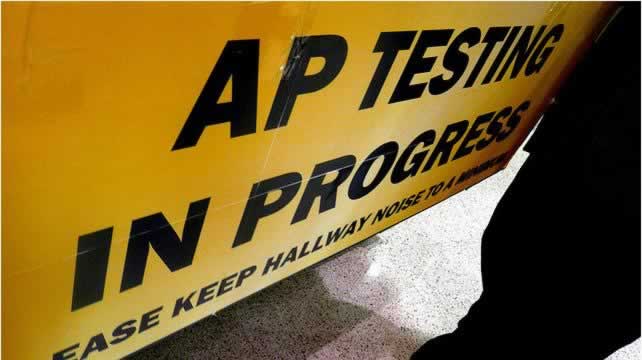The Different Flavors of Standardized Tests
When most people hear the expression “standardized tests” they automatically think of the SAT and ACT exams.
The simple reason is that those are the two most prominent standardized tests almost everyone who is applying to college has to think about.
 However, they are by far not the only tests many applicants have to know about. Mixed into the application process are several other exams—distinct from the SAT and ACT, playing different roles.
However, they are by far not the only tests many applicants have to know about. Mixed into the application process are several other exams—distinct from the SAT and ACT, playing different roles.
For many applicants, understanding their unique roles and the varying requirements colleges have in connection with these tests can be quite confusing. It is imperative to have a clear understanding of this part of the admission process.
To facilitate that clarity, here is a brief overview of these exams.
SAT and ACT
The SAT and ACT are the most important exams almost all 4-year colleges in the United States require. While they are two separate tests that have very different qualities, colleges treat them as equal. For that reason, no college will require, or even expect, that an applicant takes both—one or the other is sufficient.
My recommendation is that students stick with either the SAT or ACT. No jumping or flip-flopping between both. The fact is that there is no advantage in the eyes of a college to take both; it is not like extra credit.
Therefore, a student does better saving their energy and time and deciding early (during their junior high school year) and wisely (with the help of a test prep professional or an educational consultant) which exam is best for them.
Test-Optional or Test-Flexible Colleges
A growing number of 4-year universities do not require applicants to submit SAT or ACT scores. This means that students can entirely skip sending these scores. If they do, though, the college may ask them to submit other information to make a comprehensive evaluation of them.
Interestingly, as compelling as it is to skip turning in these exams, many schools still find that the majority of the students send in their SAT or ACT scores nonetheless. Turning in their scores is an option, of course, not a prohibition. However, the decision can be a tough one for the applicant.
To submit or not to submit?
To those seeking my counsel, I usually give these very general guidelines:
- If their test scores for the SAT or ACT fall within the middle 50% or higher of a college’s test score averages from the year before, a student should consider sending them in.
- If their test scores are lower than the middle 50% or if they are in the bottom 25%, they should consider not sending in the scores.
Additional Considerations for Test-Optional Schools
Often, what complicates the whole matter of submitting or not submitting the test scores is that colleges may use SAT or ACT scores to determine who will receive merit scholarships and how much they will be awarded. At some colleges, this is decided according to a numerical index or scale which typically includes an applicant’s SAT or ACT score. If the student’s test scores fall within a certain range, the school automatically awards them a specific amount.
This means, at some schools, not submitting test scores may take the student out of the running for scholarships altogether. Other schools may create test scores for applicants based on previous year averages. The college assigns an arbitrary test score to the student for their scholarship review.
Subject Exams
The same nonprofit organization (the College Board) that runs the SAT also offers Subject Exams. While SAT and ACTs are broad and can take hours, Subject Exams last only one hour, involve very specific academic subjects and are all multiple choice questions.
What complicates the matter of Subject Exams for applicants is to know which colleges require, recommend, or even consider Subject Exams versus which colleges do not take these scores into account at all.
Admission requirements for colleges in the United States change slowly (over several years). However, the case of Subject Exams has been different. These days, the requirements for these types of tests is changing year by year.
For a long time, many colleges required at least two subject exams with an application, sometimes three. Currently, though, the number of schools that require these exams has shrunk considerably. Moreover, those knowledgeable in these matters predict that there will be an even greater decline in future years.
Semantics of Subject Exam Requirements
What makes these developments even more confusing is the language used in many applications instructions. Knowing what is required and what is not is such an important part of the admission process that it can be frustrating when the wording is not clear.
For example, some colleges are very clear, stating that Subject Tests are “required” or “not considered.” Either expression is easy to understand. However, other colleges wind up somewhere in the middle, using “recommended” or “considered.”
In the end, such semantics can become very frustrating. It leaves the application instructions ambiguous enough that it is left up to interpretation by the student. Moreover, that often causes much anxiety. To ease the anxiety and to ensure that students submit the applications properly, they need to clarify if Subject Tests are mandatory. They can check with individual colleges or consult with an Independent Educational Consultant, such as me.
AP or IB Exams
Advanced Placement (AP) or International Baccalaureate (IB) exams are tests some students take at their high school in connection with specific honors classes. In general, colleges do not require them for the application process. At the same time, many selective colleges put much emphasis on encouraging students to take advanced classes.
A frequent question I hear from students is, “If I take an AP or IB class, am I required to send my AP or IB exam scores to colleges I apply to?”
My experience has taught me this:
- In general, if a student has good test scores and is proud of them, they should go ahead and submit them. It helps to have useful, objective information in a college application.
- If, on the other hand, the student is worried about their test scores for AP and IB exams, there is no harm in not submitting them. Most colleges do not expect to see them in the first place.
Ultimately, colleges are more interested in a student’s performance in advanced classes based on the grades they receive rather than looking at specific test scores. That is why there is no reason for applicants to worry about being punished in the admission process for not having submitted their AP or IB exam scores. It is a completely individual decision.
The Bottom Line
When it comes to understanding the world of standardized tests for college admissions in the United States, there is a lot a student must consider. It is vital that they take the time (preferably during their junior high school year) to get a clear understanding of the requirements, terminology, and possible complications.
Failing to take a deep dive into unraveling all the factors involved with standardized testing and how they may apply to them individually could lead to big mistakes or to missing something that, in the end, may cause a lot of distress and chaos. Moreover, in turn, additional time and effort later in the application process.
—
I am an Independent Educational Consultant with years of experience in the college admission process. It would be my pleasure to help you—students and parents alike—answer all questions involved with standardized test requirements. Once they are put to rest, you can move on with the application process with a clearer focus.


